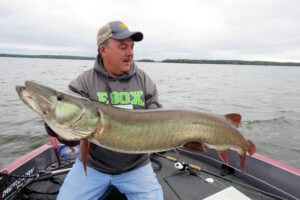By Steve Heiting
The term “every color of the rainbow” doesn’t apply to fishing lures, especially those designed for muskies. Lure manufacturers today offer far more options than even Mother Nature ever dreamed.
When I started fishing for muskies, lure colors were available in basic colors or those matching the color schemes of natural forage species. Black, white, perch, sucker and frog were common, and crappie, firetiger and bumblebee were cutting edge.
But a recent check of a major tackle retailer’s website revealed considerably more options. “Criminal,” “angry grasshopper,” “rockstar,” “superman,” “zombie,” and even “rotten cucumber” are among the choices, and celebrity names like “Aaron Rodgers” and “Lady Gaga” are in the mix.

It’s not like a selection of crazy colors belongs solely to the realm of muskie lures. After all, you can thank the makers of Great Lakes trolling spoons for colors such as “monkey puke” and “greasy chicken.” A skeptic may say wild colors are simply an attempt to sell more lures, but an angler with a hot lure would argue otherwise. And a newcomer to the sport may find it all very confusing.
So, does lure color really matter? Maybe I shouldn’t be the one to answer this, because I was once fishing for muskies during a week when the only bucktail the muskies would bite needed to have two blades — one silver and one black-nickel — with a black holoform flashabou tail. Any other combination was ignored.
Still, my best answer to the question of lure color is yes and no. Mepps, the famous lure manufacturer based in Antigo, Wisconsin, offers its Musky Killer spinner with 20 different-colored blades as well as 17 different tails, which multiplies out to 340 color combinations. All Mepps muskie spinners feature jointed construction with a split ring joining the blades and tail, so with a split ring pliers you can instantly mix and match components and their colors.
Obviously, lure color is important to Mepps. In fact, the company has spent years studying it and designs its baits according to what it calls “Mepps Color Technology.” Researchers believe fish can see colors much as we do, but rarely will a lure’s color appear the same above the water’s surface as below. That’s because water color acts as a filter to what a fish can see, and Mepps breaks this down into three colors — blue (clear water), green (algae-bloomed water) and red (tannic-stained water). All three colors heavily filter out reddish tones, sometimes to the point that red appears to be black under water, and orange can appear brown. The deeper the water, or the farther a fish is from a lure, the greater this filtering effect.
The amount of daylight also matters. In bright conditions, more light transmits into the water and colors carry deeper, but in low light colors will appear darker. For example, a blaze orange lure viewed from a distance may look brown to a fish, but as it approaches more closely the filtering effect is reduced and the lure appears brighter. This rapid change in color appearance may cause the fish to turn away.
Because a fish’s perception of color varies with water color, daylight, depth and the fish’s distance from the lure, the key factor that stands out in Mepps’ research is contrast. Numerous contrasting colors usually result in one that fish can see. “This illustrates why firetiger is such a popular and useful color,” Mepps CEO Mike Sheldon once told me.
Hall of Fame angler and lure designer Joe Bucher believes color matters, but says it ranks far down the list of priorities an angler must consider when choosing a lure. I have worked with Bucher for years, and he has consistently preached you must first find the muskies’ location, then choose a lure that will reach the zone in which they’re holding, next pick a specific lure size to which they will respond favorably, and finally determine the lure color they will bite.
Bucher’s reasoning makes sense. After all, muskies don’t frequently vary their depth or location, and their aggressiveness toward a larger or smaller bait doesn’t change often throughout the day. However, the influence of water color and daylight can change as quickly as a cloud blocks out the sun.
My recommendation to new muskie anglers is they first buy lures that are painted to match natural forage — a sucker living in clear water doesn’t look much different than a sucker in stained water. By choosing lures in natural colors, these initial selections in your tackle box will be effective in both clear and dark water. You can always add bright colors later as you find lures that you favor and your horizons broaden, and you resultingly expand your lure arsenal. Always keep an eye for lures with contrast. Firetiger, as mentioned by Mike Sheldon, is the ultimate high-contrast color. But perch and bumblebee, among others, also offer high contrast.
Finally, there is the belief of some old-time muskie anglers that “any color is good as long as it is black.” Considering that black offers the ultimate in contrast regardless of water color, those seasoned veterans are definitely onto something.
